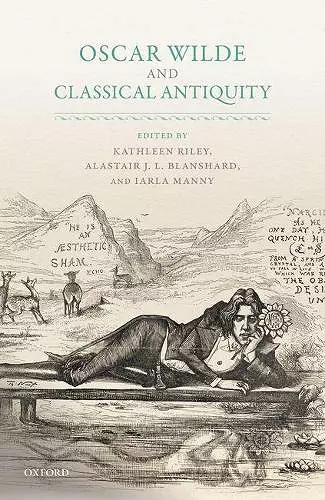Oscar Wilde and Classical Antiquity
Kathleen Riley editor Alastair J L Blanshard editor Iarla Manny editor
Format:Hardback
Publisher:Oxford University Press
Published:30th Nov '17
Currently unavailable, and unfortunately no date known when it will be back

Few authors of the Victorian period were as immersed in classical learning as Oscar Wilde. Although famous now and during his lifetime as a wit, aesthete, and master epigrammist, Wilde distinguished himself early on as a talented classical scholar, studying at Trinity College Dublin and Oxford and winning academic prizes and distinctions at both institutions. His undergraduate notebooks as well as his essays and articles on ancient topics reveal a mind engrossed in problems in classical scholarship and fascinated by the relationship between ancient and modern thought. His first publications were English translations of classical texts and even after he had 'left Parnassus for Piccadilly' antiquity continued to provide him with a critical vocabulary in which he could express himself and his aestheticism, and a compelling set of narratives to fire his artist's imagination. His debt to Greece and Rome is evident throughout his writings, from the sparkling wit of society plays like The Importance of Being Earnest to the extraordinary meditation on suffering that is De Profundis, written during his incarceration in Reading Gaol. Oscar Wilde and Classical Antiquity brings together scholars from across the disciplines of classics, English literature, theatre and performance studies, and the history of ideas to explore the varied and profound impact that Graeco-Roman antiquity had on Wilde's life and work. This wide-ranging collection covers all the major genres of his literary output; it includes new perspectives on his most celebrated and canonical texts and close analyses of unpublished material, revealing as never before the enduring breadth and depth of his love affair with the classics.
Oscar Wilde and Classical Antiquity powerfully demonstrates the degree to which Wilde's reading fueled the development of a mind that "could feel itself alive" only through encounters with literature. * Rebecca N. Mitchell, Victorian Studies *
Oscar Wilde and Classical Antiquity offers new perspectives on his most celebrated and canonical texts by adopting a uniquely multidisciplinary approach with insights into Wilde's classical sources that will be highly useful for in-depth studies of Oscar Wilde. Oscar Wilde and Classical Antiquity delineates the influence and breadth of Wilde's knowledge in the Classics, offering specific examples in the original Greek, French, Latin, and English that provide excellent source material for Wilde's fascinating essays, plays, and his novel. Oscar Wilde and Classical Antiquity has a comprehensive bibliography and provides a lasting contribution to Wildean scholarship. * Annette M. Magid, Papers on Language and Literature *
Because of its new perspectives and revealing contributions, this collection concerning Wilde's relation to classical culture warrants attention from scholars of Wilde or Classical Reception. Readers not trained, as Wilde was, in Greek and Latin will find the essays completely accessible. * John Paul Riquelme, English Literature in Transition, 1880-1920 *
An excellently edited volume ... of the highest scholarly standard, which will no doubt be of interest to both Wilde scholars and classicists. * Xavier Giudicelli, Cahiers victoriens et édouardiens *
Wilde emerges as interesting, brilliant, sharply witty, complex, both idealistic and cynical, but a dedicated classicist, sadly out of step with the mores of most of his contemporaries. ... his love affair with the Classics continued until he died, as this collection of essays amply demonstrates. * Jo-Marie Claassen, The Classical Journal *
Individual essays explore Wilde's classical education, the shaping influence of his experience as a spectator of classical drama, the impact of his classical training on his philosophy and fiction, and the significance of Roman antiquity in his writings. * Andrea Henderson, Studies in English Literature *
The book adeptly fulfills its mission statement "to demonstrate in what ways Wilde's classicism is typical, in what ways heterodox or distinctive, and where it is situated in relation to Victorian social and intellectual frameworks" . . . The assembly of Victorianists and Classicists from multiple disciplines . . . has created a multifaceted successor to Iain Ross's Oscar Wilde and Ancient Greece (2013), and offers new contributions not only to studies in Oscar Wilde and the late Victorian period, but also reciprocally to Classics. * Julianna K. Will, Bryn Mawr Classical Review *
Peter Mitchell's compact book offers a practical and informative introduction to the largely unsung but widespread presence of the working donkey (and mule) in human history [which] should herald a new strand of publications encouraging archaeologists, anthropologists and historians towards greater working-animal-mindedness in investigations of relevant eras and regions. * Jill Goulder, Antiquity *
This is a highly satisfying book, stimulating, varied, visually appealing, refreshingly jargon-free and exceptionally well edited. . . . It has much to offer anyone interested in the enigma of Wilde * Peter Raby, The Classical Review *
Eighteen years after the centenary of Oscar Wilde's death in 1900, Oxford University Press has published this excellent monographic study . . . an excellent and highly recommended contribution to Wildean studies from the perspective of the classical tradition. * Pau Gilabert, International Journal of the Classical Tradition *
I greatly enjoyed the varied viewpoints of these illuminating essays, which greatly deepened my understanding of Wilde's complex love and use of Classics and can heartily recommend the book to scholars and post-graduate students of Classical Reception, English Literature and Theatre Studies. The volume amply fulfils its stated aim of offering a model for studies based around an individual and their use of the Classical tradition. * Claire Gruzelier, Classics for All *
The analysis and inclusion of a variety of sources, including unpublished, annotated manuscripts, transcripts, and Wilde's notebooks, are an invaluable resource and welcome additions to ongoing discussions on Wilde. . . . the debates present are original, well-conceived and offer readers a concrete position from which to expand and further consider Wilde's classicism. * Robert Finnigan, The Review of English Studies *
ISBN: 9780198789260
Dimensions: 241mm x 163mm x 28mm
Weight: 736g
402 pages